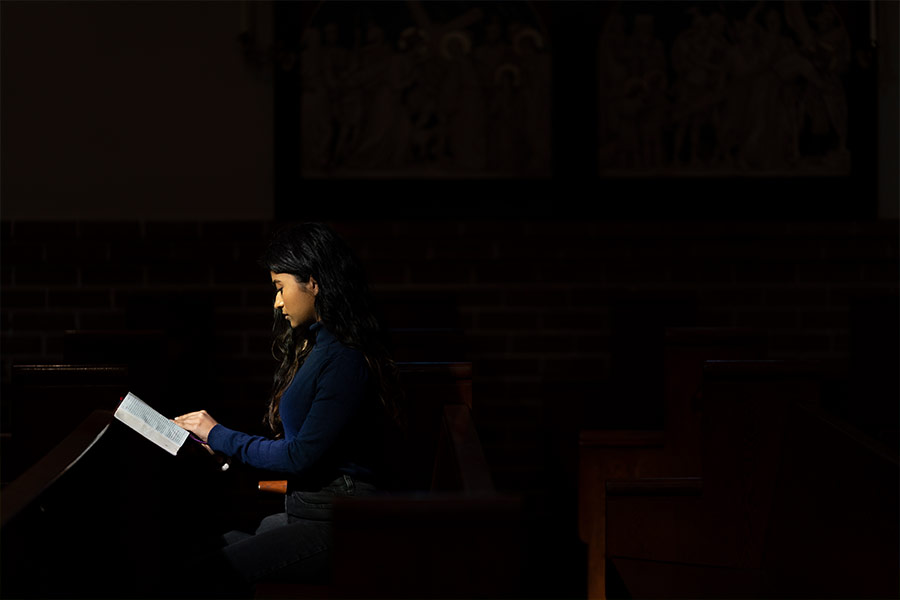This Lent, risk prayer

A young woman prays at St. Peter Church in Lindsay. (NTC/Juan Guajardo)
In college, I made Bluto Blutarsky from "Animal House" look like a choir boy. One night I got rip-roaring drunk, fell backward down a flight of stairs, split my head open. Spent the night in the hospital and got 12 stiches. My wild man act and partying was getting deadly dangerous.
A couple of nights later on the quad, I looked up at a brilliant, full moon, pondering what the hell I was doing with my life. For some reason, I voiced a simple prayer. "OK, God. If you're there, do something."
Nothing happened.
I went back to the fraternity and opened, at random, a small New Testament, "Good News for Modern Man." I got some incomprehensible passage from Romans. So much for prayer.
But in a very curious manner, a few weeks later, I got a summer job as an orderly at a nursing home. Caring for the elderly as they prepared for death filled me with joy. I began to ask the big questions about life, God and why we are here.
That prayer on the quad changed my life.
Welcome to Lent and the call to prayer. Why pray?
Prayer changes what we desire. Prayer transforms us into those who can live with God forever. Prayer impels us toward metanoia, repentance, a change in our ways of thinking, doing and being. When we really open our minds and hearts in prayer to the God who creates and so desperately loves us, watch out. Anything can happen!
So, prayer is a risk. We fear that prayer is a waste of time, that prayer doesn't "work." I prayed that I get a new job or that my mother be cured of cancer, and my prayers weren't answered.
Or we fear that prayer may really work. That God will change us as deeply and radically as the people in the Scriptures who were caught up in God's plans, tasks and purposes to transform ourselves and our world. We can be Moses and Mary and liberate our people and bring Christ into the world. We can be the Peters, Pauls and Mary Magdalenes of our times.
"Do not be afraid" is the most repeated phrase in the Bible. Don't underestimate yourself. God has need of the talents you have been given. Prayer shows us how to use and multiply our gifts (Jn 6:8-11).
Prayer plunges us into powerful processes of transformation begun at baptism. God becomes what we are so we might become what God is. That's not some crazy Jesuit spin on theology. That's St. Athanasius in the fourth century (see the Catechism of the Catholic Church, No. 460).
Pray any way you like. Read Scripture. Quietly ponder the mysteries of the rosary. Explore the Eucharist. A Jesuit once said, "When we come to celebrate Eucharist, we should wear crash helmets."
At Mass, heaven and earth meet. We are in communion with all who have gone before us marked with the sign of faith. We are united with all who receive Jesus.
Engage in the Examen of St. Ignatius. There are five simple steps:
1) Place yourself in God's presence. 2) Give thanks for the past 24 hours. 3) Replay, gently, the past day in your mind. Notice where you were in contact with God's grace and love -- and when you were not. 4) Notice what you need to work on. 5) Promise to move in the direction God leads. Pay attention to consolations, ways we move toward God and others, and desolations, ways we move away from God and others.
Open your heart and mind to the beauty and pregnant possibilities of silence. Trappist centering prayer is 20 minutes of just sitting without doing anything but focusing on God. Based on the book "The Cloud of Unknowing," this is demanding but rewarding prayer.
Comedian Lily Tomlin once joked, "Why ... when we talk to God we're said to be praying; but when God talks to us, we're schizophrenic?" Making God's reality too self-evident would make it impossible for us freely to answer, "Yes." God is always mediated to us and is always ever greater than us.
Jesuit Karl Rahner once asked, in prayer, do we ever really hear anything but our own internal rumblings? Surprisingly, he answered, "No." But what happens is, we pray and then listen. In response, the word God speaks to us is our life.
For good books on a prayer, read Mark Thibodeaux's "Armchair Mystic," a great introduction on how to actually pray. Father Richard Rohr's "Everything Belongs: The Gift of Contemplative Prayer" is short and deceptively simple. Still, it's the best book I ever read on prayer.
St. Ignatius teaches prayer is like exercise. I go to the gym three times a week, once a year. The lack of results is obvious. Regular prayer, like regular exercise, will show itself in our being more rooted in awareness of God, in service of others, and in the joy and peace radiating in our lives. Actually praying, daily, will get us in spiritual shape, ready to meet the challenges of following Jesus.
Jesuit Father Malloy is director of mission integration at Cristo Rey High School in Baltimore.
